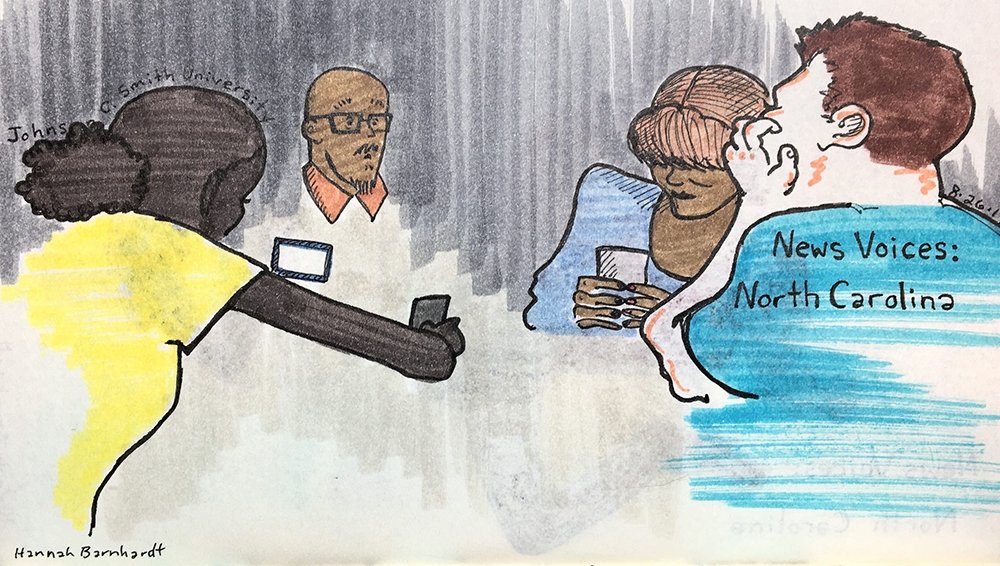Bringing News Voices to North Carolina

Much of what’s happening in the country right now — intense political partisanship, the urban-rural divide, economic inequality and increasing racial tension — has been happening in my home state of North Carolina for some time.
And it’s happening as North Carolina’s media landscape is shifting — with shrinking staff at newspapers and other traditional news outlets and the rise of promising journalism startups — in ways that reflect national trends.
At this critical moment in North Carolina media, we need to build more bridges between journalism and civic life.
Healthy communities need quality local news, and people active in civic life need timely, credible information on which to base their actions and inform their advocacy. The future of journalism and the future of democracy are intertwined.
That’s why we’re launching News Voices: North Carolina: to forge connections between North Carolinians and the newsrooms that serve them.
Kicking off News Voices: North Carolina
We’re beginning our community-engagement initiatives in Charlotte and the Triangle, and we anticipate working in places like Asheville, the Triad and Wilmington over the next two years.
We’ll host small gatherings, trainings and public conversations. We’ll foster collaborations between newsrooms and community groups. We’ll strengthen networks of journalists, media makers and people who care about quality local news and information, building stronger bonds statewide to foster better and more sustainable news coverage of North Carolina.
If you live in Charlotte, please come to our Charlotte launch party this Wed., April 19. If you live in the Triangle, join us in Durham on Mon., April 24.
We’re gathering journalists, activists, civic leaders, volunteers, artists — a mix of people who love where they live and care about the quality of local news and information. Both events are free and open to the public.
For North Carolinians who can’t make it to either event but want to participate, please take this survey. Let us know your thoughts about local media. Your responses will give us valuable insights and help shape our work.
The media in North Carolina
The urban-rural divide that defines North Carolina’s politics is also reflected in its media.
Two broadcast markets — Raleigh-Durham and Charlotte — are in the top 25 in the nation and are home to multiple TV and radio outlets. Those outlets focus on cities and provide little coverage of suburban communities.
Rural communities, meanwhile, rely heavily on small community newspapers. People at the western and eastern edges are stuck with TV news from neighboring states.
Over many decades, ownership of North Carolina’s newspapers has shifted from local companies and families to large corporations and private investment groups that tend to extract, rather than invest, in their newsrooms. It’s getting harder to find coverage of local school boards and town councils.
Coverage of state government tends to focus on political controversy, but the laws and budgets — and the impact these policies have on people’s lives — often pass without any news coverage, and without public awareness. For people in the mountains and the coastal plain, goings-on in Raleigh feel farther and farther away, yet the consequences affect everyone in the state.
Yet North Carolina is also home to a handful of stalwart locally owned outlets, strong public-broadcasting stations and trusted ethnic media.
High-quality nonprofit news organizations are filling the gaps in reporting on health, education and the environment statewide and in providing regional news in the west and on the coast. All of these organizations enjoy community goodwill, but some need help translating that support into financial sustainability.
These different outlets and entrepreneurs are dispersed across the state. But nascent partnerships are forming, and other institutions such as universities and philanthropic organizations are eager to learn how they can help nurture a stronger local news ecology.
Building bridges
Through small gatherings, public conversations and organizing, News Voices: North Carolina is setting out to find the stories that need to be told and forge the connections and partnerships to tell them.
To make News Voices work, we need help from the people who live there: journalists, community leaders, activists, academics, artists, philanthropists and faith leaders.
If we join together, we can give voice to the stories that really matter and help those stories make a strong impact. We can make North Carolina a model for the future of news.